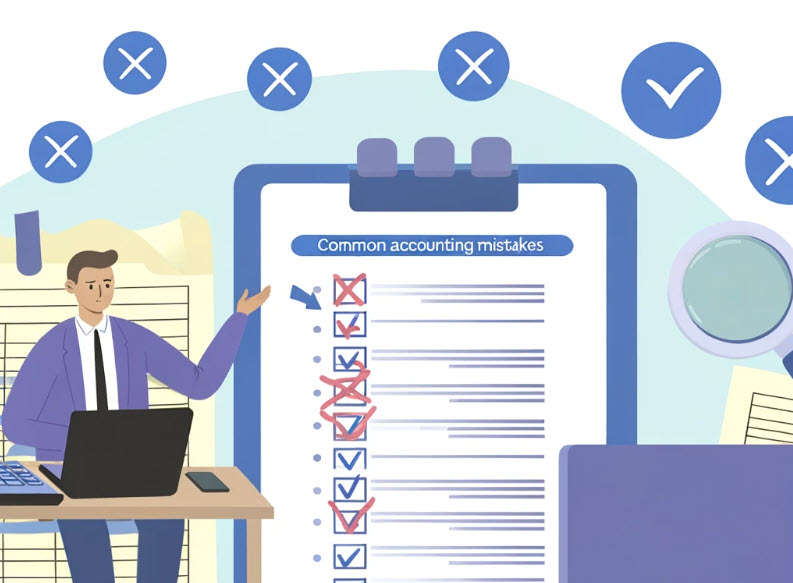Common Accounting Mistakes and How to Avoid Them
Accounting is a critical function in any business, ensuring accurate financial records, compliance with regulations, and informed decision-making. However, accounting mistakes are common and can have significant consequences, including financial losses, legal issues, and damaged reputations. This comprehensive guide will explore some of the most common accounting mistakes and provide practical tips on how to avoid them.
Common Accounting Mistakes
1. Poor Record Keeping
Maintaining accurate and organized financial records is fundamental to effective accounting. Poor record-keeping can lead to errors in financial statements, missed deductions, and difficulties during audits.
- Solution: Implement a systematic record-keeping process. Use accounting software to track all transactions and regularly reconcile accounts. Ensure that all receipts, invoices, and financial documents are properly stored and easily accessible.
2. Failing to Reconcile Accounts
Regular account reconciliation is essential to ensure that the recorded transactions match the actual bank statements. Failing to reconcile accounts can result in discrepancies and overlooked errors.
- Solution: Schedule regular reconciliations, ideally on a monthly basis. Compare your financial records with bank statements to identify and correct any discrepancies promptly.
3. Misclassifying Expenses
Accurately classifying expenses is crucial for financial reporting and tax purposes. Misclassifying expenses can lead to incorrect financial statements and potential tax issues.
- Solution: Establish clear categories for expenses and ensure that all transactions are accurately classified. Use accounting software that automates expense categorization to reduce the risk of errors.
4. Overlooking Small Transactions
Small transactions, such as petty cash expenses, can add up over time. Overlooking these transactions can lead to inaccuracies in financial records.
- Solution: Track all transactions, regardless of size. Use petty cash logs and expense reports to ensure that small transactions are recorded and accounted for.
5. Ignoring Accounts Receivable
Failing to monitor and collect accounts receivable can impact cash flow and profitability. Delayed payments or unpaid invoices can lead to financial strain.
- Solution: Implement a systematic accounts receivable process. Send invoices promptly, follow up on overdue payments, and establish clear payment terms with customers.
6. Not Backing Up Financial Data
Losing financial data due to hardware failures, software issues, or other disruptions can be disastrous. Not having backup systems in place can lead to significant setbacks.
- Solution: Regularly back up financial data using both on-site and cloud-based solutions. Ensure that backups are secure and easily retrievable in case of emergencies.
7. Incorrect Payroll Management
Payroll errors can lead to compliance issues, unhappy employees, and financial penalties. Miscalculations, incorrect tax withholdings, and late payments are common payroll mistakes.
- Solution: Use reliable payroll software to automate calculations and tax withholdings. Regularly review payroll processes and stay updated with tax regulations to ensure compliance.
8. Failing to Separate Personal and Business Finances
Mixing personal and business finances can complicate accounting and lead to inaccurate financial records. It can also create issues during audits and tax filings.
- Solution: Maintain separate bank accounts and credit cards for personal and business use. Clearly distinguish between personal and business expenses to ensure accurate accounting.
9. Neglecting Tax Deadlines
Missing tax deadlines can result in penalties, interest charges, and increased scrutiny from tax authorities. It’s essential to stay on top of all filing and payment deadlines.
- Solution: Use a tax calendar to keep track of important tax deadlines. Set reminders and automate tax filings where possible to avoid missing deadlines.
10. Lack of Financial Analysis
Failing to analyze financial data can prevent businesses from identifying trends, making informed decisions, and improving profitability. Relying solely on basic financial statements is insufficient for strategic planning.
- Solution: Regularly review and analyze financial statements, including income statements, balance sheets, and cash flow statements. Use financial ratios and performance metrics to gain insights into the business’s financial health.
How to Avoid Accounting Mistakes
1. Invest in Accounting Software
Modern accounting software can automate many accounting tasks, reduce the risk of errors, and provide real-time financial insights. Invest in reliable accounting software that suits your business needs.
2. Hire Qualified Professionals
Hiring experienced and qualified accountants or bookkeepers can ensure accurate financial management. They can provide expert advice, identify potential issues, and maintain compliance with regulations.
3. Implement Internal Controls
Establishing internal controls can help prevent and detect accounting errors. Internal controls include policies and procedures for authorizing transactions, safeguarding assets, and verifying financial information.
4. Provide Regular Training
Ensure that all employees involved in accounting processes receive regular training. Stay updated with changes in accounting standards, tax regulations, and software updates to maintain accuracy.
5. Conduct Regular Audits
Regular internal and external audits can help identify and correct accounting errors. Audits provide an independent review of financial records and processes, ensuring accuracy and compliance.
6. Maintain Clear Communication
Effective communication between departments is essential for accurate accounting. Ensure that all relevant information is shared promptly and accurately to prevent misunderstandings and errors.
Conclusion
Avoiding common accounting mistakes is essential for maintaining accurate financial records, ensuring compliance, and making informed business decisions. By implementing robust accounting processes, investing in the right tools, and seeking professional advice, businesses can minimize errors and achieve financial success. Regular reviews, training, and audits further enhance the accuracy and reliability of financial information.


